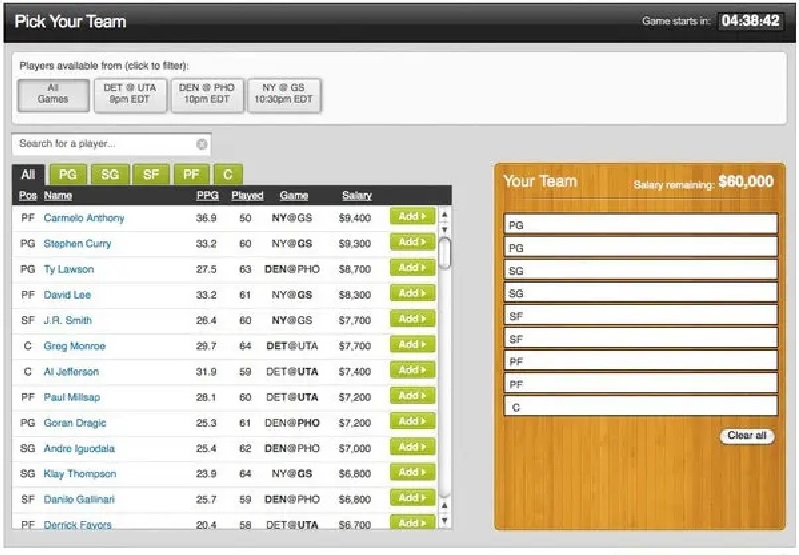What is Fantasy Sports Betting?
Fantasy sports is a knowledge-based sports betting activity that requires bettors to make analytical assessments of player performance in real sporting events. In practice, therefore, participants draft players and earn points based on their real-world statistics. Think of it like this - Imagine you're a football manager who can choose the best players from all teams in a league to create your ultimate squad. After building your team, you earn points based on how well real athletes perform in real games.
The concept of fantasy sports originated in the 1960s with elementary versions of fantasy baseball. The internet era spurred its evolution, leading to the launch of major platforms like DraftKings and FanDuel. The two sports betting giants introduced daily and weekly fantasy sports contests, making them more accessible and engaging. Their innovative formats and large prize pools attracted millions of users, driving exponential growth.
Today, fantasy sports betting significantly boosts iGaming engagement and revenue by combining the thrill of sports with strategic gameplay, appealing to a wide audience of sports enthusiasts and gamblers alike.
Understanding Fantasy Sports Betting
In fantasy sports betting, participants form virtual teams created through drafts or auctions, where they select players based on their expected performance. The key mechanics include:
Formation of Teams:
Scoring System:
Formats:
Common formats include season-long leagues, where teams compete over an entire sports season, and daily or weekly contests, where participants draft teams for individual games or short periods.
Fantasy Sports Vs Virtual Sports Vs eSports: What’s the Difference?
Fantasy sports, virtual sports, and eSports are all popular forms of modern online betting entertainment, but they differ significantly in their format, objectives, and audience engagement. For iGaming operators, it is sometimes easy to get confused by the distinctions between these new up-and-coming forms of betting entertainment. Here is a brief overview of each for clarity:
Fantasy sports involve participants creating virtual teams composed of real athletes from a professional sport. Virtual sports are altogether different. They are computer-generated simulations of real sports events, using advanced graphics and algorithms to create realistic and dynamic representations of traditional sports like football, basketball, horse racing, and more. Esports, on the other hand, involves competitive gaming where players or teams compete in video games at a professional level.
Here is a comparison of the key features of each:
| Key features | Fantasy sports | Virtual sports | eSports |
|---|---|---|---|
| Game format | Users create virtual teams using real player stats from actual sports events. | Computer-generated simulations of real sports events, running continuously. | Competitive video gaming, where players or teams compete in various game genres. |
| Strategy | Involves statistical analysis, player performance tracking, and strategic team management. | Betting based on odds and virtual race outcomes; minimal user control over event progression. | Requires high skill, reflexes, and strategic gameplay; involves both individual and team-based tactics. |
| Monetisation | Entry fees for contests, subscription models, in-game purchases, advertising, and sponsorship. | Betting on simulated events, advertising, sponsorship deals, and integrating virtual sports into betting platforms. | Tournament entry fees, sponsorship, advertising, streaming revenue, and in-game purchases. |
| Audience | Sports enthusiasts who enjoy strategic gameplay and sports statistics. | Bettors seeking continuous betting opportunities and fans of simulated sports experiences. | Gamers and eSports fans who follow competitive gaming for a younger, tech-savvy demographic. |
Types of Fantasy Sports Contests
Fantasy sports betting offers various contest types to engage users.
Cash games:
Provide safer bets with a 50% chance of winning.
Tournaments:
Feature larger prize pools but more competition.
Head-to-head match-ups:
Pit two players against each other, emphasising greater strategic play.
Large group competitions:
Attract many participants, offering significant rewards for top performers.
Prize distribution in tournaments is usually in the form of guaranteed prize pools (GPPs), which typically reward the top percentage of entrants. The higher share goes to participants in the top positions.
Winning strategies involve understanding scoring systems, studying player performance trends, and balancing risk by mixing star players with high-potential underdogs. This variety in contest formats, combined with strategic depth, enhances user engagement and drives revenue for iGaming platforms.
Integration with iGaming Platforms
Integrating fantasy sports into sports betting platforms creates significant convergences with traditional sports. By combining both betting types on a single platform, operators can provide a unified experience where users can participate in fantasy contests and place traditional sports bets at the same time. Such integration provides sports bettors with the excitement of wagering on real-time events with the opportunity to leverage their knowledge of players to compete with others in fantasy sports cash games and tournaments.
From a technical standpoint, the requirements for successful integration include software solutions capable of handling high volumes of real-time data, and advanced algorithms for accurate scoring and odds calculation. In addition, comprehensive data analytics tools are needed for operators to monitor performance, understand user behaviour, and optimise offerings.
Boosting Engagement through Fantasy Sports Betting
Including fantasy sports within an iGaming platform has been shown to consistently boost user engagement and player retention. The interactive experience encourages users to stay actively involved by managing their virtual teams and tracking real-time player performances. This continuous engagement drives frequent platform visits, enhancing overall user activity. Moreover, fantasy sports appeal to a broad audience, from casual sports fans to dedicated bettors, further increasing platform usage.
Enhanced engagement also stems from its social elements, such as competing against friends or participating in larger fantasy leagues. Like online gaming, such interactions foster a sense of community and loyalty, further driving user retention. Added to this, comprehensive data analytics used in fantasy sports allow operators to personalise offers and optimise the overall experience, ensuring long-term customer satisfaction and increased revenue.
Revenue Generation Potential
Entry fees for fantasy contests
Entry fees for tournaments and contests generate immediate revenue for sports betting operators, requiring participants to pay to compete. Moreover, larger prize pools attract more users and increase overall intake. In addition, offering premium memberships provides players with access to exclusive features such as advanced statistics, personalised recommendations, and special contests. These memberships can create a steady revenue stream leading to sustained profitability for operators.
In-game purchases & cross-selling opportunities
Using monetisation methods traditionally used in online gaming, such as power-ups or advanced analytics tools, further boosts earnings. Cross-selling opportunities are also possible. By integrating fantasy sports with traditional betting, operators can encourage users to place bets on actual sports events, increasing overall betting volume. Enhanced user engagement and retention through fantasy sports lead to more consistent revenue streams and higher lifetime value per customer, making it an attractive addition to any sports betting platform.
Targeted advertising
Sponsorships with sports leagues and media companies
Partnerships with major sports leagues and media companies provide exclusive access to premium content and branding opportunities. For instance, collaborations with leagues like the NFL or NBA allow operators to integrate official team logos, player images, and real-time stats into their platforms. Features such as these enhance credibility and user experience. In addition, media partnerships, such as those with ESPN or NBC Sports, enable cross-promotion through various channels, including TV broadcasts, online streaming, and social media.
Emerging Markets & Future Trends
The fantasy sports betting market is poised for substantial growth over the coming years, with a market size projected to reach $56.36 billion by 2030. This represents a growth rate of 14.1% from 2024 to 2030. Projected growth in this niche is driven by the increasing popularity of fantasy sports, the integration of real-time data analytics and the increased use of mobile technology.
Operators should tailor offerings to regional sports preferences, cultural nuances, and regulatory environments to enhance user engagement and market penetration. For instance, in North America, focusing on American football and basketball is essential, while in Europe and Asia, football (soccer) and cricket hold mainstream popular appeal. Increased convergence of fantasy sports with traditional sports betting could further enhance engagement. Deeper integration into the broader gaming industry is projected to increase user retention and engagement and ultimately boost future revenues for operators.
How to Build Your Own Fantasy Sports Business in 2024
If you are seeking to add fantasy sports to your online offering or indeed build an online fantasy sports business, contact Altenar today to access all the tools and expertise you need to realise your ambitions in 2024.














